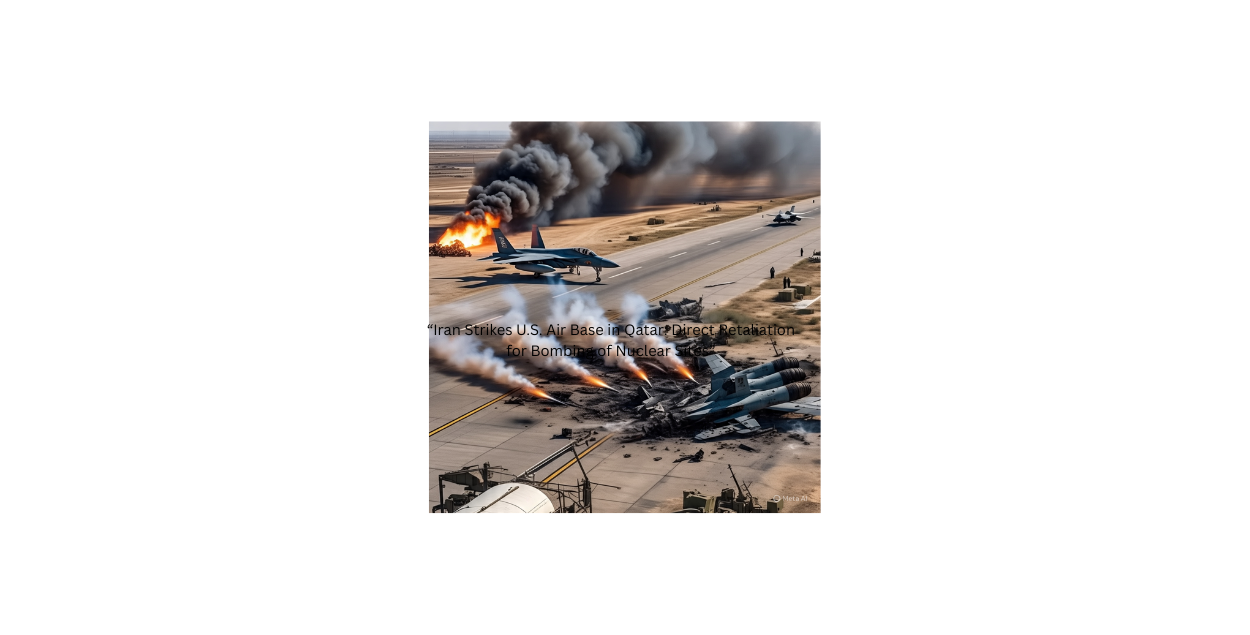FnF News
FNF News | U.S. & Middle East Conflict
Published: June 24, 2025
By: Khadija Khan, Senior Conflict Reporter
Iran Claims Missile Strike on U.S. Al‑Udeid Air Base in Qatar After American Bombing of Nuclear Sites
Doha / Tehran / Washington, D.C. — Iran’s Islamic Revolutionary Guard Corps (IRGC) has claimed responsibility for a precision missile strike targeting the Al‑Udeid Air Base in Qatar, one of the most significant American military installations in the Middle East. This retaliatory action follows the United States’ recent covert bombing campaign on multiple Iranian nuclear sites.
Video footage aired by Iranian state television and satellite imagery released by open-source analysts appear to confirm missile impacts near the perimeter of the air base. While no U.S. casualties have been officially reported, Pentagon sources acknowledge that the strike represented a “serious escalation.”
What We Know So Far
According to the IRGC, the missile barrage—referred to internally as Operation Besharat Fatah—was launched in the early hours of Tuesday morning. Sources inside Tehran claim the number of missiles fired matched the number of bombs the U.S. allegedly dropped during Operation Midnight Hammer, the codename for last weekend’s bombing of Iran’s nuclear infrastructure.
U.S. Central Command has not confirmed the precise number of incoming missiles or their impact points, but acknowledged that defensive measures were activated at Al-Udeid and that the base sustained “minor infrastructural disruptions.”
Iranian officials stated they gave advance warning to Qatar through back channels, claiming the intent was to avoid civilian casualties while “responding proportionately to an act of war.”
Background: Operation Midnight Hammer
On June 22, 2025, U.S. B-2 bombers targeted three key nuclear sites inside Iran—Natanz, Fordow, and Isfahan—striking deep underground centrifuge bunkers with precision-guided ordnance. This marked the first direct American strike on Iranian soil since the Soleimani drone operation in 2020.
The Pentagon framed the strikes as necessary to prevent Iran from reaching near-weapons-grade uranium levels, citing Israeli intelligence reports and satellite reconnaissance. Iran responded by promising “measured, strategic retaliation.”
Reaction from Regional Players
- Qatar has strongly condemned the strike on its territory and summoned the Iranian ambassador. While reiterating its opposition to nuclear proliferation, Doha emphasized it would not allow its territory to become a “battleground for regional conflicts.”
- The United States has raised its defense posture across the Gulf, including at bases in Bahrain, Kuwait, and Saudi Arabia. U.S. Navy assets in the Persian Gulf have been placed on full alert.
- Israel, believed to have shared intelligence with the U.S. ahead of the strike, has increased readiness along its northern borders in anticipation of retaliatory action by Hezbollah.
Energy Markets and Global Response
Crude oil prices jumped 9% in overnight trading, with Brent reaching $103 per barrel amid fears of wider regional destabilization. Shipping insurers have hiked premiums for vessels passing through the Strait of Hormuz.
European Union diplomats have called for an emergency UN Security Council session, warning that without urgent de-escalation, the region could be pulled into a broader military conflict.
U.S. Political Response
In Washington, congressional leaders are divided. Republicans have praised the Biden administration’s strong stance against Iranian nuclear ambitions, while Democrats warn of “mission creep” and are demanding a War Powers Resolution briefing.
Senator Lindsey Graham said the strike on Al-Udeid shows “Iran’s willingness to drag the region into a broader war,” while Senator Chris Murphy (D-CT) accused the White House of failing to coordinate with Congress ahead of Operation Midnight Hammer.
Risk of Wider War
Analysts warn that Iran’s missile retaliation may only be the first wave. IRGC-backed militias in Syria and Iraq have reportedly mobilized. The Houthis in Yemen issued a statement pledging solidarity and readiness to “strike Zionist and American targets.”
Cybersecurity firms are also monitoring heightened Iranian-linked activity against U.S. energy and defense infrastructure, raising fears of parallel attacks in cyberspace.
While diplomacy has not been ruled out, several international observers fear the conflict may now enter a cycle of retaliation that will be hard to contain.

